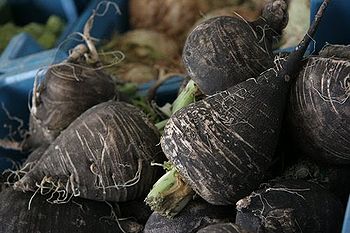Black Radish
From Wikiwel
see also :
Other names : Black radish, or Raphinus sativus L. var. niger, Winter Radish, Rammenas.
A round, white-fleshed, dark-purple-skinned radish.
Special Precautions of Black Radish
As a member of the cabbage family, black radish contains the same cancer-protective compounds found in broccoli, Brussels sprouts and other members of this large group of temperate-zone vegetables. However, the same chemoprotective substances also have adverse side effects.
- Anti-Thyroid or Goitrogenic : Black radish, and all members of the cabbage family -- broccoli, Brussels sprouts, cabbage, Chinese cabbage, kale, mustard, turnip and red radish -- can cause goiter because they all contain glucosinolates. Glucosinolates are modified amino acids. Goiter is the enlargement of the thyroid gland due to iodine deficiency. When radish is chopped or chewed, glucosinolates break down into isothiocyanate, oxazalidine-2-thione, nitrite and thiocyanate ion. Isothiocyanates, oxazalidine-2-thione and isothiocyanate ion can cause goiter, by interfering with the production and secretion of essential thyroid hormones. Without these hormones, the body's ability to burn and use energy is jeopardized.
- Carcinogenic : Nitrite, a byproduct of glucosinolate, can cause cancer when it combines with amines forming N-nitroso compounds. Stomach cancer is one of the most common type of cancer associated with nitrosamines. Nitrite also reacts with hemoglobin, producing methmeglobin. Unlike hemoglobin, methmeglobin cannot carry oxygen, so a person with high levels of blood methmeglobin will turn blue, or become cyanotic. People with cyanosis generally have bluish nails, lips and cheeks because their blood is not being properly oxygenated.
- Allergen : Diallyl sulfide is mainly found in garlic, but it is also present in black radish as a byproduct of glucosinolate. Diallyl sulfide is an allergen and irritant. The allergy generally begins on the fingertips; it cannot be prevented by using gloves because the compound penetrates most commercial type gloves. It can cause rhinitis, contact dermatitis and allergic asthma in susceptible persons. Because diallyl sulfide allergy is rare, diallyl sulfide has not been included in allergy tests, but it has been recommended for inclusion in tests in the future.
- Do not eat two servings of vegetables from the same family, such as black radish with broccoli, cabbage, turnip, Brussels sprouts, kohlrabi or kale at the same meal, since you are likely to receive a double dose of glucosinolates. Eat small servings of black radish and vegetables from this vegetable family. Do not eat black radish every day, especially if you have a history of hypothyroidism. Hypothyroidism is a condition caused by an underactive thyroid gland, which results in goiter --- an enlargement of the thyroid gland due to iodine deficiency or eating too many vegetables from the cabbage family. Consult your doctor if you have allergies or iodine deficiency.
The benefits of Black Radish are
- Rich in vitamins : Black radish is full of an assortment of vitamins and has a significant amount of vitamin C and other nutrients. This makes it great in the winter months when people are battling colds and need that extra boost of vitamins and minerals. Alternatively, it started to become popular with sailor for its long shelf life and aid in preventing and/or treating scurvy.
- High in fiber : Black radish helps prevent constipation, because it is high in fiber and water. A diet high in fiber combined with plenty of fluids will help maintain regular bowel movements, which in turn supports overall bowel health. The high fiber content keeps you feeling full longer and can help support weight loss efforts.
- Supports gallbladder function : Your gallbladder holds and distributes bile to your digestive tract. Black radish is particularly noted for its stimulating effects on bile production, liver detoxification and cleaning of the gallbladder. All of this combined helps maintain a healthy, problem-free digestive tract.
- Balances digestive flora : Black radish is also helpful in maintain a balanced digestive flora due to its antibacterial properties. It is important to keep proper amounts of good bacteria in your digestive tract, because when they become out of balance you can experience adverse affects such as diarrhea or constipation, bloating, pain, illness, and fatigue.
- Helps regulate high blood pressure : Recent research has shown that black radish can help regulate high blood pressure. This is due to the potassium content of black radish. When a person has a lower than recommended intake of potassium it is very easy for salt levels to become out of balance, therefore increasing your potassium intake can help lower high blood pressure.
- Treats coughs and fortifies lungs : Traditionally black radish has been use to treat coughs and colds while fortifying the lungs. It has been used in soups, natural cough syrups and powdered capsules for centuries, because of its cleansing properties within the respiratory system.
Main Combination
- Liver Dysfunction, Hepatitis : Artichoke + Milk Thistle (or Black Radish)
- Biliary dyskinesia (stimulation of the gallbladder): Artichoke + Boldo (or Black Radish)
